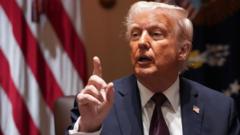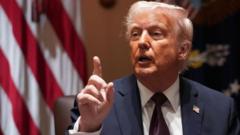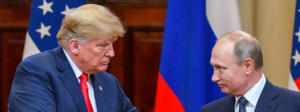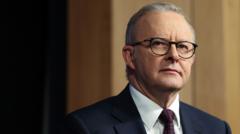In response to the escalating trade war, Carney emphasizes the need for a new economic direction and retaliatory measures against US tariffs, signaling a turbulent path ahead for both nations.
**Canada's PM Mark Carney Declares End of Old Ties with the US Amid Tariff Conflicts**
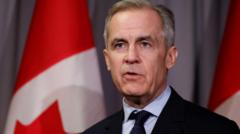
**Canada's PM Mark Carney Declares End of Old Ties with the US Amid Tariff Conflicts**
Canadian Prime Minister Mark Carney announces a fundamental shift in trade strategy as tariffs from the US prompt a reevaluation of Canada’s economic ties.
Canadian Prime Minister Mark Carney has labeled the long-standing relationship between Canada and the United States as "over," citing significant shifts in economics and security cooperation due to new US tariffs. In a press conference following a cabinet meeting in Ottawa, Carney explained that the current situation requires Canadians to "fundamentally reimagine our economy" in light of President Donald Trump’s recent tariff announcements targeting imported vehicles and parts.
The new tariffs, which include a substantial 25% tax on vehicles and vehicle parts, were deemed "permanent" by Trump, signaling a significant departure from the historical integration seen between the two economies. According to Carney, the 1965 Canada-US Automotive Products Agreement, once heralded as a landmark deal, has been effectively nullified by these tariffs. He stressed that Canada must bolster its own automotive industry and rethink its trade relations with other global partners to mitigate the impact of US policies.
As a proactive response, Canada has prepared retaliatory tariffs designed to exert "maximum impact" on US goods, having already imposed approximately C$60 billion ($42 billion) in tariffs against the United States in retaliation for earlier measures on steel and aluminum. Carney's government is working to ensure that Canadian industries can withstand the effects of US tariffs, potentially shifting trade dynamics in the region.
The auto tariffs are scheduled to take effect on April 2, with repercussions rippling through the trade corridors shared by the US and Canada. Meanwhile, Trump warned both Canada and the European Union not to collaborate against the US in this trade dispute, threatening further sanctions if they did so.
The Canadian political landscape is reacting rapidly to the developments: opposition leader Pierre Poilievre condemned the tariffs as "unjustified," while NDP leader Jagmeet Singh labeled them a "betrayal." Singh has pivoted his campaign to engage directly with affected workers in auto hubs like Windsor, Ontario, quite close to the Detroit border.
As the election date of April 28 approaches, Carney has recalibrated his campaign strategy to address the trade war fundamentally. It remains unclear what long-term implications these tariffs and counter-tariffs will have on trade relations, but both Canada and the US may be forced to navigate a new, contentious economic landscape moving forward.
In parallel, Mexican president Claudia Sheinbaum has also reacted to the US tariffs, stating that Mexico will defend its economic interests and hinting at a comprehensive strategy in response to the American measures. The interplay between these North American countries is set to evolve further, especially in the context of the free trade agreements that bind them together.





